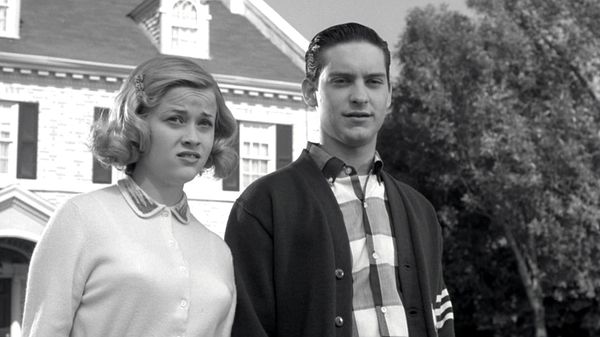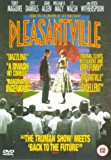Eye For Film >> Movies >> Pleasantville (1998) Film Review
Pleasantville
Reviewed by: Scott Macdonald

David (Tobey Maguire) is a social outcast, who has an encyclopedic knowledge of a Fifties television show called Pleasantville. The style of this television show is engagingly quaint, everyone says "Swell", and there are milkmen, picket fences, and no one ever, ever shares the same bed. Effervescently cheerful, and by equal proportions, tight and thoughtless. (There's a fantastic shot in which 12 basketballs all score within five seconds, fully realising the perfect, unaltering world.)
He prepares for a marathon viewing, during which there are quiz prizes. Unfortunately, David and his delightful sex-siren sister, Jennifer (Reese Witherspoon) fight and break the television remote. One thing leads to another, and a plot device ensures David and Jennifer are transported inside the television to Pleasantville, and from here, the film springboards into carefully balanced comedy, and surprising social commentary.

Jennifer and David are on polar opposites of this development: David is finally in his element, he knows everything about Pleasantville, and keeps the status quo faithfully, fully knowing what will happen next. He quickly explains who is who in Pleasantville, with George and Betty (William H Macy and Joan Allen) as their doting and generous mother and father.
However, Jennifer refuses to accept her future destiny in "Nerdville", and immediately begins having sex with the boys from the show. And David, as Bud, begins inadvertently altering the script, while at work, he forgets the order in which he must do things, and his boss, Mr Johnson (Jeff Daniels) questions him about it and learns about free will. Both, in their own way, provide the seed for the alterations to the world.
Gary Ross' bright and thoughtful film mixes 50s TV and noir's visual style with his gifts as a screenwriter. The film initially surprises the viewer by indicating it's going to be a simple comedy, and eventually bites off a lot of surprising issues, while only attempting to provide answers to a few in it's two hour timeframe. It's visual style is saturated colour in the real world, and deep contrasted black and white in the television world. However, as David and Jennifer give the startled inhabitants of Pleasantville knowledge and free will, the world begins to change. Ross opts for a staggering visual metaphor, in that small pieces of the world begin to take on rich, saturated colours.
The inhabitants learn about sex, Mark Twain, the true geography of Pleasantville, and in one of the film's finest moments, Bud introduces Mr Johnson to a book of fine art, in full colour. I was bowled over and deeply moved, imagining what it must feel like to see Van Gogh's Starry Night from his monochromatic eyes for the first time. He begins painting. The residents are stunned.
Eventually, some of the other residents of Pleasantville become coloured, inciting rebellion from the non-coloureds. A faint irony that keeps recurring throughout history, is that repression and fascism occurs through the discovery of fresh ideas. That it's frightening and disturbing to them to find out new things, and as such they wish to remain in the past, while all the coloureds have moved on. A public lewdness trial scene (Mr Johnson ends up painting a nude portrait of Betty), struck me visually of the classic To Kill A Mockingbird, with all the coloureds on one level, and the non-coloureds together at ground level.
Ross's metaphors are heavy-handed, not least a tree exploding in flame after Betty's sexual awakening, but most of the film is profound, and not subtle. Other times it remains a gentle, and skillfully constructed parable in which many questions are asked, and many, many more are implied.
Reviewed on: 09 May 2005



















